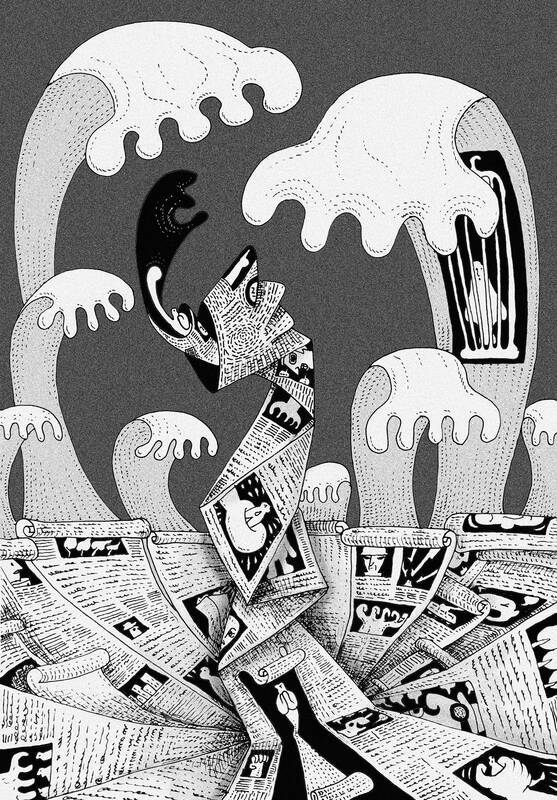Saturday marked the first anniversary of the arrest of Guatemalan journalist Jose Ruben Zamora. As the founder and editor of the newspaper elPeriodico, Zamora spent decades uncovering political corruption before being arrested on fabricated money-laundering charges. In June, he was handed a six-year prison sentence, but the prosecution, insisting on a 40-year term, is expected to appeal.
Prosecutors said that the harsher punishment would compensate those whose “name and reputation” have been tarnished by Zamora and his publication. Their real goal is to deter other journalists from following in Zamora’s footsteps.
The prosecution alleged that Zamora tried to launder the equivalent of US$38,000, a donation he received to keep elPeridico afloat. The newspaper, which Zamora founded in 1996, was forced to shut down in May after enduring nearly two decades of threats, intimidation, arbitrary judicial proceedings and cyberattacks. Apart from Zamora, nine journalists who were associated with the newspaper have also been charged with obstructing justice. Fearing for their safety, most of them have fled the country. Two of Zamora’s lawyers have also been arrested and charged with submitting false evidence.

Illustration: Mountain People
When representatives from Reporters Without Borders (RSF) managed to visit Zamora in prison in May, the 66-year-old publisher appeared physically and psychologically frail. He has lost 16kg as a result of being confined to a 10m2 cell in complete isolation, with just one hour of access to sunlight per day. After enduring several episodes of physical and psychological torture, ranging from sleep deprivation to an insect infestation in his cell, he trusted only the food brought by his family during visiting days, which he stored in a cooler. However, Zamora’s wife and children, fearing possible arrest, have since fled Guatemala.
Journalists in Guatemala have been operating in an increasingly hostile and violent environment for years, with reporters and outlets — particularly those investigating political corruption — routinely harassed and intimidated. Before his arrest in July last year, Zamora faced numerous threats and assaults due to his investigative work. In 2003, he was held hostage in his home after uncovering links between the Guatemalan military and organized crime groups. In 2008, shortly after elPeridico reported that one of Guatemala’s major political parties had received funding from drug traffickers, Zamora was kidnapped, drugged, tortured and then dumped by the side of a road.
However, the attacks on Guatemalan journalists have escalated since former president Jimmy Morales took office in 2016. The nation ranks 127th (out of 180) in RFS’ Press Freedom Index. In 2021, elPeridico reported that current Guatemalan President Alejandro Giammattei had accepted bribes from Russian businessmen in exchange for mining permits. The story triggered a wave of subsequent revelations and evolved into an international corruption scandal dubbed “The Russian Plot.” This provoked Giammattei’s ire, and led to a fresh wave of assaults and arbitrary legal proceedings against the newspaper’s staff and Zamora himself.
Against the backdrop of the Guatemalan government’s growing authoritarianism, Zamora’s relentless fight to prove his innocence has turned him into a powerful symbol of democratic resistance. Every Guatemalan journalist, from community-based indigenous reporters to the owners of media outlets that once competed with elPeridico, recognizes Zamora’s conviction as part of a government-led effort to restrict press freedom.
As one reporter told RSF: “If the owner of a major newspaper has been persecuted and unjustly convicted, literally all of us are at risk.”
With one of the country’s most prominent journalists behind bars and the judiciary colluding with the government to criminalize journalism, self-censorship could soon become the norm. After all, the real goal of Zamora’s trial is to suppress independent journalism and preserve a culture of elite impunity. The purpose of the crackdown on elPeridico, which published more than 150 articles about government corruption and the links between the state and private-sector entities, was to intimidate other media outlets into toeing the line.
The report on May’s international press freedom observation mission to Guatemala, in which RSF participated, starkly illustrates how Zamora’s case is being used to send a chilling message to all Guatemalan journalists who dare to challenge those in power. The report highlights numerous instances when journalists have been charged with crimes for reporting on corruption or covering the trials of corrupt public figures and politicians. According to the Guatemalan Journalists Association, threats and intimidation have forced at least 20 journalists to flee the country in recent years. Former anti-corruption judges and prosecutors have faced a similar fate.
All this is happening at a time of political upheaval in Guatemala after the first round of the nation’s presidential election was marred by the disqualification of multiple candidates and various legal maneuvers. For example, following anti-corruption candidate Bernardo Arevalo’s unexpected second-place finish, a court ruling suspended his party’s legal status, and police raided its headquarters, ostensibly on behalf of Giammattei’s allies. Guatemalan democracy is already at risk, and the crackdown on journalism is pushing it perilously close to the edge.
At this pivotal moment, we urge the Guatemalan authorities to stop criminalizing journalism. This includes dropping all charges against targeted journalists, overturning Zamora’s conviction and ordering his immediate release.
In the meantime, we call on journalists and media-freedom activists worldwide to advocate for their Guatemalan colleagues and demand Zamora’s release. The targeted persecution of elPeridico’s journalists and the newspaper’s subsequent closure have severely eroded the Guatemalan public’s right to know what their government is doing. The blatant abuse of the judicial system to stifle independent journalism must not be tolerated. When a government systematically undermines press freedom, all other freedoms are in jeopardy.
Christophe Deloire is secretary-general of Reporters Without Borders. Jose C. Zamora is the son of jailed elPeriodico publisher Jose Ruben Zamora.
Copyright: Project Syndicate